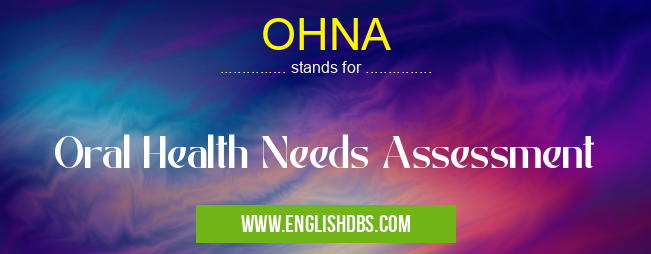What does OHNA mean in HEALTHCARE
OHNA stands for Oral Health Needs Assessment. It is a comprehensive evaluation of the oral health status of a specific population or community. OHNA aims to identify unmet oral health needs, determine the factors contributing to these needs, and develop evidence-based recommendations for interventions to improve oral health outcomes.

OHNA meaning in Healthcare in Medical
OHNA mostly used in an acronym Healthcare in Category Medical that means Oral Health Needs Assessment
Shorthand: OHNA,
Full Form: Oral Health Needs Assessment
For more information of "Oral Health Needs Assessment", see the section below.
» Medical » Healthcare
Key Objectives of OHNA
- Assessment of Oral Health Status: OHNA collects data on the prevalence and severity of oral diseases, such as caries, periodontal disease, and oral cancer.
- Identification of Risk Factors: It analyzes individual and community-level factors that contribute to poor oral health, including access to dental care, socioeconomic status, dietary habits, and tobacco use.
- Development of Interventions: Based on the identified needs and risk factors, OHNA develops evidence-based recommendations for interventions to improve oral health outcomes. These interventions may include prevention programs, educational campaigns, and policy changes.
Benefits of OHNA
- Improved Oral Health: OHNA helps identify and address unmet oral health needs, leading to improved oral health outcomes for individuals and communities.
- Targeted Interventions: By identifying specific risk factors, OHNA enables the development of targeted interventions that effectively address the underlying causes of poor oral health.
- Resource Allocation: OHNA provides data to inform decision-makers about resource allocation, ensuring that funds are directed towards areas with the greatest need.
- Monitoring and Evaluation: OHNA establishes a baseline for future monitoring and evaluation, allowing for the tracking of progress in improving oral health outcomes.
Essential Questions and Answers on Oral Health Needs Assessment in "MEDICAL»HEALTHCARE"
What is an OHNA (Oral Health Needs Assessment)?
An OHNA is a systematic process to identify and prioritize oral health needs and concerns within a community. It involves gathering and analyzing data from various sources to determine the prevalence, severity, and distribution of oral health conditions, as well as the factors that contribute to them. The goal is to develop evidence-based strategies and interventions to address these needs and improve oral health outcomes.
Why is an OHNA important?
An OHNA provides valuable information that can help policymakers, health professionals, and community organizations make informed decisions about allocating resources and implementing oral health programs. It allows them to target interventions to specific populations and address the most pressing oral health concerns, ultimately improving the overall health and well-being of the community.
What are the steps involved in conducting an OHNA?
The steps typically include:
- Scoping and planning: Defining the purpose, scope, and methodology of the assessment.
- Data collection: Gathering data from multiple sources, such as surveys, interviews, medical records, and epidemiological studies.
- Data analysis: Interpreting the data to identify patterns, trends, and unmet needs.
- Development of recommendations: Formulating evidence-based recommendations for policies, programs, and interventions.
- Implementation and evaluation: Putting the recommendations into practice and evaluating their effectiveness.
Who should be involved in an OHNA?
An OHNA should involve a multidisciplinary team of professionals, including oral health experts, epidemiologists, data analysts, community representatives, and stakeholders from various sectors. This ensures a comprehensive and collaborative approach to addressing oral health needs.
How can the results of an OHNA be used?
The results of an OHNA can be used to:
- Inform policy decisions and allocate resources for oral health programs.
- Develop targeted interventions to address specific oral health concerns.
- Monitor progress and evaluate the effectiveness of oral health initiatives.
- Advocate for oral health equity and access to care.
Final Words: OHNA is a valuable tool for assessing oral health needs and developing evidence-based interventions to improve oral health outcomes. By identifying unmet needs, analyzing risk factors, and recommending appropriate strategies, OHNA contributes to the promotion of optimal oral health for individuals and communities.
